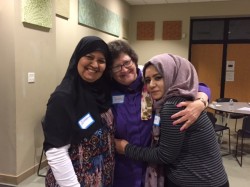Last Word | August 2nd, 2017

When I moved to this community 23 years ago from Dallas, Texas, I knew I would have much to learn. I was coming to a part of my country that was completely different from what I had known when it came to geography, climate, and ethnicity. What I did not expect was how much I would learn from people who immigrated here from much farther away and from a wide variety of cultures.
My education in what “we the people” truly means began only after I became a teacher. Prior to then, I did not have the ability to travel abroad. But when I began to teach, I began to learn about the world beyond books as I volunteered to take students abroad.
I have now lived in three countries as well as three states within the U.S. I know what it is to move to where I know no one, where I do not speak the language or know the customs, and to experience the struggle of adapting.
Yet it is here in Fargo-Moorhead, as I have worked in our immigrant/refugee community, that I have learned the most about the world and how to be “we the people” together. I would like to share with you some of those lessons in a brief way. I will share facts that have shaped my learning, but not the names of those involved, though my dear friend mentioned below has allowed me to share her story.
Perhaps more than any other trait I have learned courage from my friends who have immigrated here, whether by choice or under duress as a refugee. It is exceedingly difficult to leave all that you know and go where you may or may not be welcomed.
The friend who embodies this trait for me is a middle-aged woman from Iraq whose husband was killed as he went to pray at a Baghdad mosque, and whose home was completely lost to fire in the bombing. She and her daughter narrowly escaped dying in that fire by the mere chance that they had chosen to sleep at a nearby relative’s house that night.
After so much sorrow and horror, she and her daughter fled to a refugee camp in Syria, where they lived for four years before being given asylum in the U.S. The embassy, after many months of paperwork and checking all matters from identity to health, sent them to Fargo.
Once this woman had been a preschool teacher, but when she lost her home she also lost all documentation of her education. And then there was the language barrier, needing to learn how to manage on next to nothing in a new financial situation, working as a hotel cleaner and bringing up her daughter, learning to drive, all without any family to support her.
We became friends when she asked her English teacher to find her a tutor who could be her friend, a woman around her age. For the last ten years she has enriched my life with her courage. It was with great joy that I celebrated her daughter’s high school graduation and the citizenship ceremony of both women.
Despite having little, again and again my international friends have shown me what real hospitality is. They invite me into their homes and insist on serving me tea, which includes food, something savory or sweet, perhaps both. Sometimes they want to fix an entire meal, which on their tight budget is something far beyond the normal notion of hospitality many Americans have.
Oftentimes they want to give me a gift, some item of their own that they noticed I like or something they made or found that reminds them of something I have mentioned liking: a scarf, a drawing of a dog or a yellow rose, a ring with a green stone, a pitcher…and on and on.
Their desire to give to a friend, regardless of their economic situation, reminds me a great deal of the woman in the Bible story who gives a mite at the temple. A rich man has taken pride in what he gave, but it was only of his excess. Jesus praises the widow as the one who gave the most.
When I consider my own giving and hospitality, I realize that I have much to learn from the free, loving hospitality of my immigrant friends.
Teachers, psychologists, and sociologists are all concerned about the lack of resilience in the younger generation, which comes down to ways we ourselves have socialized our children. Perhaps one of the many benefits of my own students working alongside me with our immigrant population is that they will come to see and hear, to witness firsthand what it means to be truly resilient.
In the past year, my work has moved from tutoring to facilitating Narrative 4 story exchanges between immigrants and nonimmigrants in our community. My hope is that by bringing people together to hear one another’s stories from an equal position—each equally vulnerable in telling her own story and hearing it repeated in first person by another, each equally respected in that process—that empathy and understanding will grow.
Those who participate in these exchanges – no matter where they fall on the political spectrum -- speak of coming to realize that we must put aside our assumptions and learn to listen to one another.
The only way we can become strong, flexible, resilient humans in healthy communities, is if we enter into the narratives of life together and learn to appreciate that each individual is precious, valued and should be protected. This is how we humans will endure. These friends from all over the world have taught me more than endurance; they have shown me how to live with purpose and love.
Make the opportunity to get to know the immigrants among us. Contact me to join an exchange.
January 15th 2026
January 15th 2026
December 18th 2025
November 18th 2025
September 23rd 2025




_(1)_(1)_(1)_(1)_(1)__293px-wide.jpg)
__293px-wide.jpg)